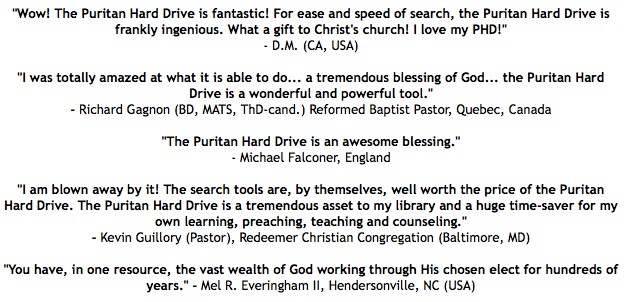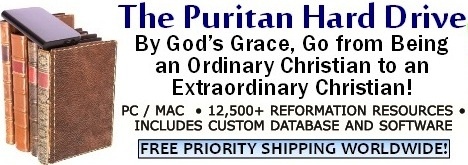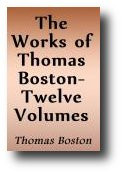 Loading... Please wait...
Loading... Please wait...- SWRB Home
-
Free Resources
- Short Listings Of Free Reformation & Creation Resources
- Free Reformed, Puritan, Covenanter and Creationist Videos
- Thousands of Links to Free Audio, Video and Printed Resources
- Free Puritan Books, Reformed MP3s, and Calvinist Videos
- Puritan Quotes, Free Reformation MP3s, Reformed Books and Calvinist Videos From PuritanDownloads.com On FaceBook
- Shipping & Returns
- Blog
- Privacy Policy
- Contact Us
- Payment Options
- Help
-
About Us
- Sitemap
Pastor Scott Brown, on the left in the video above, is the Director of the National Center for Family-Integrated Churches (NCFIC)
Resource Categories
- PURITAN HARD DRIVE REVIEWS
- PASTOR ROB VENTURA ON THE PURITAN HARD DRIVE
- DR. VODDIE BAUCHAM, JR. ON THE PURITAN HARD DRIVE
- R. C. SPROUL ON SWRB
- DR. JOEL R. BEEKE ON THE PURITAN HARD DRIVE
- PASTOR GREG L. PRICE ON THE PURITAN HARD DRIVE
- DR. MATTHEW MCMAHON ON THE PURITAN HARD DRIVE
- PASTOR SCOTT BROWN ON THE PURITAN HARD DRIVE
- PASTOR W. J. MENCAROW ON THE PURITAN HARD DRIVE
- JOAQUIN FERNANDEZ ON THE PURITAN HARD DRIVE
- PASTOR DAVID SILVERSIDES ON THE PURITAN HARD DRIVE
- JOHN HENDRYX ON THE PURITAN HARD DRIVE
- PASTOR KEVIN GUILLORY ON THE PURITAN HARD DRIVE
- RICHARD BENNETT ON THE PURITAN HARD DRIVE
- DR. KENNY RHODES ON THE PURITAN HARD DRIVE
- JUSTIN RAWSON ON THE PURITAN HARD DRIVE
- PASTOR JAMES WALLACE ON THE PURITAN HARD DRIVE
- PASTOR RICHARD GAGNON ON THE PURITAN HARD DRIVE
- PASTOR JOE HAYNES ON THE PURITAN HARD DRIVE
- DR. STEVEN DILDAY ON THE PURITAN HARD DRIVE
- PASTOR ANDREW COMPTON ON THE PURITAN HARD DRIVE
- TERENCE ELLARD ON THE PURITAN HARD DRIVE
- PASTOR JERRY JOHNSON ON THE PURITAN HARD DRIVE
- PASTOR DAVID PETRIE ON THE PURITAN HARD DRIVE
- JIM DODSON ON THE PURITAN HARD DRIVE
- PASTOR BRIAN SCHWERTLEY ON THE PURITAN HARD DRIVE
- PASTOR PHIL GIBSON ON THE PURITAN HARD DRIVE
- MEL R. EVERINGHAM II ON THE PURITAN HARD DRIVE
- PAUL BLYTH ON THE PURITAN HARD DRIVE
- STEVE KETTLER ON THE PURITAN HARD DRIVE
- D. M. (CALIFORNIA) ON THE PURITAN HARD DRIVE
- MICHAEL CAUGHRAN ON THE PURITAN HARD DRIVE
- WIILIAM NOPPER IV ON THE PURITAN HARD DRIVE
- LINDA THERIAULT ON THE PURITAN HARD DRIVE
- WILLIAM WARNOCK ON THE PURITAN HARD DRIVE
- ROBERT KOH ON THE PURITAN HARD DRIVE
- WHAT'S ON THE PURITAN HARD DRIVE?
- ALL PURITAN HARD DRIVE VIDEOS
- PHD-ODE INSTALLATION VIDEOS
- COMMENTS ON SWRB
- ALL PURITAN QUOTE VIDEOS
- PURITAN HARD DRIVE SCREENSHOTS
- PURITAN HARD DRIVE MINISTRY AND DONATION OFFERS
- TABLE OF RESOURCE CATEGORIES
- Advanced Studies
- SWRB SERMONAUDIO MOBILE APP
- Apologetics
- Assurance
- Attributes and Holiness of God
- Augustine
- Banner of Truth
- Baptism
- Beginners
- Bibles (Geneva, KJV, Hexapla, etc.)
- Biblical Counseling
- BIBLICAL HD COLLECTION
- Biblical Interpretation (Hermeneutics)
- Biographies and Autobiographies
- Calvinism and the Sovereignty of God
- CALVINISM HD COLLECTION
- CALVINIST CLASSICS HD COLLECTION
- Charles Spurgeon
- Children's Books
- CHRISTIAN EDUCATION HD COLLECTION
- Christian History
- Church Government
- Civil Government and Resistance
- CLASSIC CHRISTIAN HD COLLECTION
- Classic Puritan and Reformed Sets
- Commentaries
- Contemporary Issues
- Covenant Theology and Covenanting
- COVENANTER HD COLLECTION
- Covenanters and Covenanted Reformation
- Creation and Creationism
- Creeds, Confessions and Covenants
- Cults, False Religions, Psychology, Humanism
- Dealing with Affliction, Suffering, and Sickness
- Debates
- Dutch Reformed
- Education and Home Schooling
- English Puritans, Covenanters and Reformers
- Family, Children, Home, and Family Worship
- First Reformation
- Five Points of Calvinism (TULIP)
- For Pastors and Elders
- For Seminary Students
- FREE PURITAN & REFORMATION MP3 AUDIO SERMONS/BOOKS
- FREE PURITAN BOOKS, REFORMATION MP3s, PDFs, VIDEOs
- George Gillespie
- God's Law, The Ten Commandments, etc.
- Greg L. Price on Headcoverings
- Heaven, Hell and the Final Judgment
- Holy Days (Lord's Day, Christmas, Easter, etc.)
- HOME SCHOOL HD COLLECTION
- Intermediate Studies
- John Bunyan
- John Calvin
- John Knox
- John Owen
- Jonathan Edwards
- Justification
- Languages, Dictionaries, Reference, etc.
- LOOK WHO LOVES THE PURITAN HARD DRIVE
- Lord's Supper (Communion)
- Marriage, Courtship, etc.
- Martin Luther and Lutheranism
- Martyrs and Persecution
- Other Protestant Works
- Predestination and Providence
- PRESBYTERIAN HD COLLECTION
- Presbyterians and Presbyterianism
- Prophecy, Antichrist, and Eschatology
- PROTESTANT HD COLLECTION
- PSALM SINGING MP3s (COMPLETE SET)
- Psalters, Psalm Singing and Music
- Puritan Facts
- PURITAN FAST SERMONS (1640-1653) - 34 VOLS SET
- Puritan Fast Sermons 1640-1653
- Puritans and Puritanism
- PURITAN HARD DRIVE
- REFORMATION HD COLLECTION
- Reformation History
- Reformed and Puritan Classics
- Reformed Baptist
- REFORMED BAPTIST HD COLLECTION
- REFORMED HD COLLECTION
- REFORMED PRESBYTERIAN HD COLLECTION
- Reformed Presbytery, RPNA Protesters, etc.
- Reformed Theology
- Reformed Worship, The Regulative Principle, etc.
- Roman Catholicism, the Jesuits, Islam, etc.
- Salvation and Evangelism
- Samuel Rutherford
- Sanctification, Prayer and Holiness
- Scottish Covenanters
- Scottish Presbyterianism
- Scripture Song MP3s (Psalms and Bibles Verses)
- Second Reformation
- Separation, Unity, Uniformity, etc.
- Sermons and Sermon Collections
- Solemn League and Covenant
- Theology and Doctrine
- Third Reformation
- Thomas Watson
- Westminster Confession, Assembly and Divines
- Authors (All A to Z)
Phone Orders:
(780) 450-3730
To obtain free Reformation books, Puritan MP3s and Calvinistic videos, SWRB discount coupons, etc., add yourself to SWRB's Puritan and Reformed email list by using the form above.
The Works of Thomas Boston - 12 Volume Set
Resource Details
Resource Description
This download consists of 2 zipped files containing a total of 12 volumes.
"One of the most valuable sets of all time, Boston's Works have been read and re-read ever since their first publication in the 18th century" (Joel Beeke's Reformation Heritage Books email of Aug. 27, 2002).
By common consent Boston takes rank in the highest class of our practical religious writers; and in respect of spiritual usefulness his works have largely followed him. Except the Shorter Catechism and the Pilgrim's Progress, no book, perhaps, has contributed so much to mould the religious character of Scotland as his Fourfold State (F.C. Magazine, VI, p. 256 as cited in Johnston, Treasury of the Scottish Covenant, p. 479).
Ian Tallach, in the Foreword to The Beauties of Thomas Boston (p. xii) states,
Of the many great divines who have adorned the ecclesiastical and theological scene in Scotland, Thomas Boston must be reckoned as among the greatest. Dr. Andrew Thomson who wrote Thomas Boston: His Life and Times, asserts that 'if Scotland had been searched during the earlier part of the eighteenth century there was not a minister of Christ within its bounds who, alike in personal character and in the discharge of his pastoral functions, approached nearer the apostolic model than did this man of God.'
Dr. James Hamilton writes,
Thomas Boston whose peaceful walk with God is not yet forgotten in Ettrick Forest, and whose writings, originally designed for his own shepherds, are now praised in all the churches, and most prized by those Christians who have farthest grown in grace (cited in Johnston, Treasury of the Scottish Covenant, p. 477).
McGowan, in the Encyclopedia of the Reformed Faith (p. 38), also notes,
Boston was an orthodox federal Calvinist committed to the theology of the Westminster Confession. His federal theology was neither legalistic nor conditional in its understanding of grace.
On Boston's notes in the Marrow of Modern Divinity, James Henry (author of Theron and Aspasio) comments,
I never read the Marrow, with Mr. Boston's Notes, until this present time (1755) and I find, by not having read it, I have sustained considerable loss. It is a most valuable book; the doctrines it contains are the life of my soul, and the joy of my heart. Might my tongue or my pen be made instrumental to recommend and illustrate, to support and propagate such precious truths, I should bless the day wherein I was born. Mr. Boston's Notes on the Marrow are, in my opinion, some of the most judicious and valuable that ever were penned (cited in Brown's Gospel Truth Accurately Stated and Illustrated, by... James Hog, Thomas Boston, Ebenezer and Ralph Erskine, and Others; Occasioned by the Republication of the Marrow of Modern Divinity, p. 7).
Furthermore, in Brown's Gospel Truth (pages 107-110) we find a very useful sketch of the character and capabilities of Thomas Boston, as drawn by some of his closest friends (the three ministers, Colden, Wilson and Davidson). These pages are an edifying read in themselves; and we will supply you with a few short comments from this section,
Mr. Boston was... of a strong and faithful genius, of a lively imagination, such as affords what is called a ready wit, (which, instead of cultivating, he laid under a severe restraint,) of tender affections, a clear and solid judgment... There were few pieces of learning that he had not some good taste for... He had an admirable talent at drawing a paper, which made a statesman, a very able judge, say, (when Mr. Boston was clerk of the Synod of Merse and Teviotdale,) that he was the best clerk he had ever know in any court, civil or ecclesiatic... as a minister, he had on his spirit a deep and high sense of divine things, was mighty in the Scripture... His knowledge and insight in the mystery of Christ was great, though a humbling sense of the want of it was like to have quite sunk and laid him by, after he began to preach. He had a peculiar talent for going deep into the mysteries of the gospel, and at the same time making them plain, particularly in making intelligible their connection with, and influence upon, gospel-holiness; notable instances of which may be seen in his most valuable treatise, "Of the Covenant of Grace," and in his sermons on Christ in the form of a servant... No wonder his ministrations in holy things were all of them dear and precious to the saints. He was fixed and established upon solid and rational grounds in the Reformation principle, in opposition to Popery, Prelacy, superstition, and persecution... Far from serving the Lord with that which cost him nothing, it was his delight to spend and be spent in the service of the gospel... zeal and knowledge were in him united to a degree rarely to be met with... He was exceedingly cautious and scrupulous of any thing new or unprecedented, until he was thoroughly satisfied of its necessity and grounds... He was a scribe singularly instructed into the kingdom of God, happy in finding out acceptable words -- a burning and shining light.
Davidson further states,
The acquaintance I had with him, and the frequent opportunities I had of hearing him preach, I look upon as one of the greatest privileges I was favoured with in my early days, and which I still reflect on with great pleasure. He was one of the most powerful preachers I ever heard open a mouth... There were few men (if any) in his day, who courted popularity less than he did; nay, he rather shunned it, but, like his shadow, it followed him wherever he went, for his ministrations were savoury and acceptable to all who had a relish for the truth as it is in Jesus, and a love to that holiness of heart and life which the belief of it never fails to influence in the minds of all the children of God (Gospel Truth, p. 110).
In concluding his memoir of Boston in Gospel Truth, Brown notes,
Few writings, if any, are more acceptable and useful. The following epitaph was written by Mr. R. Erskine:
"The great, the grace, judicious Boston's gone,
Who once like Athanasius bold stood firm alone;
Whose golden pen to future times will bear
His fame, till in the clouds his Lord appear."
Regrettably, however profitable most of Boston's writing is to all Christians, we would be remiss not to mention that in some small sections of his works he clearly sides with the backslidden Revolution church (against the Covenanters). Boston's errors on this point are countered by Andrew Clarkson's masterful book Plain Reasons for Presbyterians Dissenting from the Revolution Church of Scotland. Also Their Principles Concerning Civil Government, and the Difference Betwixt the Reformation and Revolution Principles.
Finally, of Boston, David Lachman writes,
He took an active part in the Marrow Controversy, having 'relished [the Marrow] greatly' since first finding a copy in a cottage while engaged in pastoral visitation in Simprin... John (Rabbi) Duncan aptly characterized Boston as a 'commonplace genius'... he infused it (Reformed Orthodoxy) with fresh life and warmth, influencing first his parish and eventually all of Scotland.
His theology can be characterized as what came to be known as 'Marrow theology'. From early in his ministry he emphasized a free offer of the gospel, an assurance focused on Christ and not in the believer himself, and the power of grace in the life of the believer rather than the threatenings of the law. These and the like emphases are evident throughout his works. His first published book originated in a course of sermons preached in Simprin and again in Ettrick. After a series of mishaps, Human Nature in its Fourfold State (E, 1720) was published anonymously. His most influential work, it has been reprinted perhaps 100 times and translated into a variety of languages. The Bible aside, it had an influence second to none in the religious life of Scotland for well over 100 years.
A fine linguist, Boston taught himself Hebrew... His Memoirs is a classic (less his confusion about the Covenanters--RB); primarily a spiritual autobiography, it recounts his life with an endearing candour... The Complete Works (12 vols, A, 1848-52 is the definitive edition (Dictionary of Scottish Church History and Theology, pp. 88-89).
Commentary on the (Westminster) Shorter Catechism (volume one and two), by Thomas Boston, is also volume one in Boston's 12 volume set of Works.
Boston's work is the most comprehensive reference set ever penned on the Westminster Shorter Catechism. Concerning the Shorter Catechism, A.F. Mitchell states, "...it is a thoroughly Calvinistic and Puritan catechism, the ripest fruit of the Assembly's thought and experience, maturing and finally fixing the definitions of theological terms to which Puritanism for half a century had been leading up and gradually coming closer and closer to in its legion of catechisms (The Westminster Assembly: Its History and Standards)."
The Westminster Shorter Catechism is the "king of the catechisms" for shear power of expression, combining logical cogency with succinctness. Thomas Boston's two volume exposition of the Westminster Shorter Catechism is unrivalled; there is nothing else like it.
Here you have the cream of Puritan catechisms married to the cream of clear Puritan exposition! This is likely Thomas Boston's most important work. A set that will meet numerous needs, ranging from use in family worship, Christian education and personal study, to sermon preparation -- and for help in settling debated questions on the Presbytery floor.
A one-of-a-kind set of books that will serve your family for generations to come!
The Works of Thomas Boston (Volume 3) contains:
- Sermons, Chiefly on Communion Occasions
- The Crook in the Lot (one of the best books on God's sovereignty and how to profit spiritually from suffering, sickness, and trials)
The Works of Thomas Boston (Volume 4) contains:
- Sermons on Various Practical Subjects
The Works of Thomas Boston (Volume 5) contains:
- The Art of Man-Fishing
- The Distinguishing Characteristics of True Believers
- The State and Character of True Believers
The Works of Thomas Boston (Volume 6) contains:
- Miscellaneous Questions
- Miscellaneous Tracts
- Paraphrase on the Epistle to the Galatians
- Practical Discourses
The Works of Thomas Boston (Volume 7) contains:
- A Brief Explication of the First Part of the Assembly's Shorter Catechism
- The Marrow of Modern Divinity (On the Covenants, the Gospel and the Law)
- Everlasting Espousals
- The Mystery of Christ in the Form of a Servant
- The Peculiar Mercy and Business of Life Opened Up and Applied
- The Evil and Danger of Schism (see Clarkson's Plain Reasons for a refutation)
- The Necessity and Foundations of a Throne of Grace for the Behoof of Poor Sinners
- The Evidences and Causes of the Decay of Religion in the Soul Discovered (and Its Cure)
The Works of Thomas Boston (Volume 8) contains:
- Human Nature in Its Fourfold State
- A View of the Covenant of Grace from the Sacred Records
The Works of Thomas Boston (Volume 9) contains:
- Sermons on Various Practical Subjects
The Works of Thomas Boston (Volume 10) contains:
- Sermons on Various Practical Subjects
- Sermons on the Name and Attributes of Christ
- The Christian Life Delineated in Several Practical Discourses
The Works of Thomas Boston (Volume 11) contains:
- Discourses on Prayer
- A View of the Covenant of Works from the Sacred Records
- A Memorial Concerning Personal and Family Fasting and Humiliation
The Works of Thomas Boston (Volume 12) contains:
- The Author's Address to His Children
- Memoirs
All resources for sale on this website, with the exception of Scottish Metrical Psalms MP3s, are available on the Puritan Hard Drive .
VIDEO INTRODUCTION TO THE PURITAN HARD DRIVE


Find Similar Resources by Category
Phone Orders:
(780) 450-3730
To obtain free Reformation books, Puritan MP3s and Calvinistic videos, SWRB discount coupons, etc., add yourself to SWRB's Puritan and Reformed email list by using the form above.








































